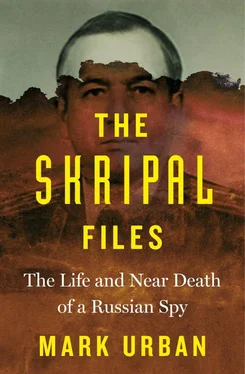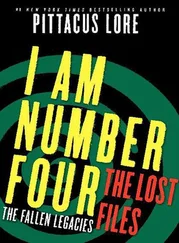Once an agent was on the payroll, taken on, say, in Copenhagen as Gordievsky had been, and returned to Moscow, they could be run by visiting case officers from the operations team. These people travelled into Russia using ‘non-official cover’, and were therefore a good deal less visible to KGB counter-intelligence than Moscow-based SIS types who were under heavy surveillance. There were other advantages also to using London-based handlers, notably that if their agent travelled outside Russia it was easier and more discreet for someone from P5 Operations to meet them than for an officer from Moscow Station to leave the country at the same time as his or her asset. The corollary of course was that when the London-based visiting case officers did come to Russia, they were completely vulnerable, lacking diplomatic immunity, if their cover was blown.
This tight-knit team, only a dozen or so case officers, had once been one of the gladiatorial arenas for ambitious SIS officers, the beating heart of the Master Race. By 1996 it had lost some of its lustre. But even so, what every SIS officer interested in counter-intelligence or K Branch-type across the river knew was that it was in the Russian operations and targeting sections that a case officer could still play the intelligence game at its highest level.
Whatever the improvement in political mood music with Russia, the burgeoning of commercial and cultural ties, the irreducible logic of the old Cold War spy business still held true in one sense. If the SVR and GRU were still trying to recruit British agents then they would have to be countered. Gordievsky and Mitrokhin may have given a belt-and-braces confidence in the 1980s that there were no penetrations in the UK’s intelligence agencies, but things never stood still. The mission of ensuring, through counter-intelligence operations, that key British institutions remained clean would have to go on.
As for those tasked to do it, finding an agent remained a fearsome challenge. And when it came to running one in Moscow, where there were literally thousands of Russian operatives hunting spies, that was among the toughest things you could do. And at the top of this peak of professional ambition and difficulty was that most challenging Russian recruitment target: the GRU.
It is mid-July 1996, and Colonel Skripal is serving in the GRU rezidentura, or station, in the Spanish capital. The military intelligence people, along with the SVR station and the legitimate diplomats, all lurk behind the stern facade of the embassy on the Calle de Velázquez.
This enormous building looks more like the palace of culture or party headquarters in Minsk or Makhachkala than a typical Madrid foreign mission. It had been completely rebuilt starting in 1986 and the workers were just getting around to the snagging five years later when the state whose interests the great edifice represented collapsed. Like many Soviet embassies abroad, the smoked glass, marble, and chandeliers had been brought in from the Motherland. Western ‘special services’ had shown such persistence during the Cold War, trying to exploit any construction work to lace an embassy with bugging equipment, that the most minute attention had to be given to keeping the place free of listening devices. That included bringing containers of construction material from home.
So why was Skripal even serving there, given his resignation four years earlier? The general, the deputy director of the GRU, that he’d gone to had of course refused to accept it. And unless you had reached retirement age or were badly ill, the army could still make it hard for you to leave. What’s more, too many officers around the rank of colonel and major general, the customary seniority for the rezident or station chief, had managed to get themselves out. It left the service desperate for experienced men with good records.
Early in 1993, in an attempt to keep him happy, Skripal had been offered the job of rezident in Paris. Now that was a place he could have lived well with Liudmila and Yulia (his son, Sasha, was entering higher education by then and would remain in Russia). But someone with better connections managed to snatch that plum from his grasp and a couple of months later he was offered a special mission in Spain. He would be reporting direct to the Centre, bypassing the rezident. It was a sensitive task, and he would be his own boss.
So after a couple of months of special training, including a crash course in Spanish, the Skripals were sent to Madrid in September 1993. With the usual posting lasting three years, Richard Bagnall’s pitch had come as Sergei and Liudmila were already setting their sights on the return home.
Having heard the MI6 man’s nervous play for his services in el Retiro and then met again subsequently to say what he wanted, Skripal knew the pressure was on him to deliver. Having decided he wanted the money and the ticket out of Russia that MI6 could offer, he didn’t have long to do it because once he was back home in Moscow any kind of meeting with MI6 would be far riskier. So how could the colonel convince the British of his value and at the same time establish what the intelligence people call ‘bona fides’, evidence that he was indeed a senior member of an organization that MI6 had spent decades struggling to penetrate?
Skripal had put some effort into this, in the privacy of his flat, naturally. The results, committed to paper and folded into an envelope, were tucked into his jacket as he went to meet Richard once again. The contents were so compromising that if anyone in the rezidentura had found them, his guilt would be established in an instant.
The colonel left the Russian diplomatic compound and headed south, for the centre of the city. One of the useful skills he’d been taught during those years at the academy was counter-surveillance, sometimes referred to as ‘combing’. This procedure can take many forms depending on whether the officer is going to the meeting by foot, on public transport, or by car. But through doubling back, loitering on deserted platforms or quiet roads, and constantly checking, a skilled officer can spot any surveillance. And while a rezidentura had the people and cars to conduct operations to make sure its own officers were not being followed to agent meets, they were limited in number and well known to Skripal.
Bagnall had that day positioned himself in one of Madrid’s smartest hotels. It fitted with his businessman’s cover, of course, and it was also standard service tradecraft for an agent meet. Sometimes a second officer might be in the reception, or elsewhere near the entrance watching the asset arrive, making sure he or she wasn’t being followed. In more hostile environments there might be more elaborate surveillance around the meeting point. In a European capital things could be kept low-key. The advantage of the hotel was that even if some goon from the Russian embassy did tail Sergei to the meet, he would get no further than the lobby, because as Skripal took the lift up to Bagnall’s room it would be impossible for anyone to follow without it becoming completely obvious. And what went on in that room would, until the MI6 man reported back to London at least, be known only to the two of them.
After the pleasantries, they sat down, Skripal removed the envelope from his pocket, and drew out a large folded piece of paper. Upon it was an elaborate design drawn with all the precision and care of someone with his lengthy schooling as a military engineer. There were boxes connected by lines, dozens of them. Inside each box, details had been typed for neatness and legibility.
Skripal had produced a complete chart of the organization and command of the GRU. Nobody in MI6 had seen anything like this for eighteen years, since Rezun had defected in Geneva. And of course Skripal’s version was better because it had the added fidelity of being compiled by someone who knew many of the agency’s senior leaders personally and had been serving in it for more than fifteen years.
Читать дальше












